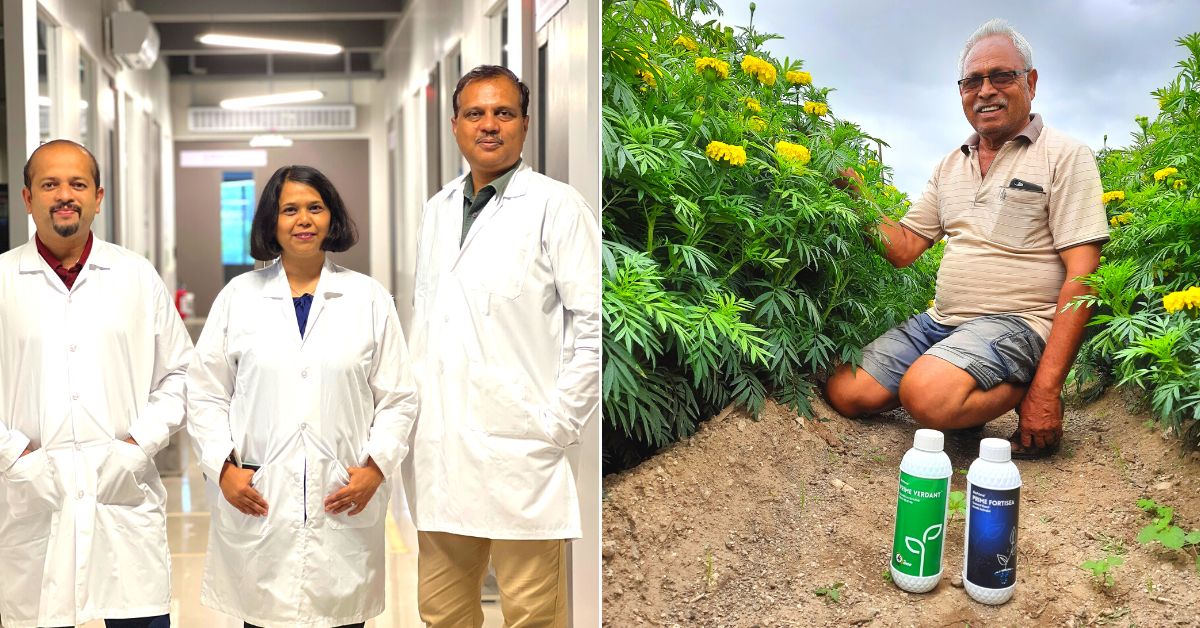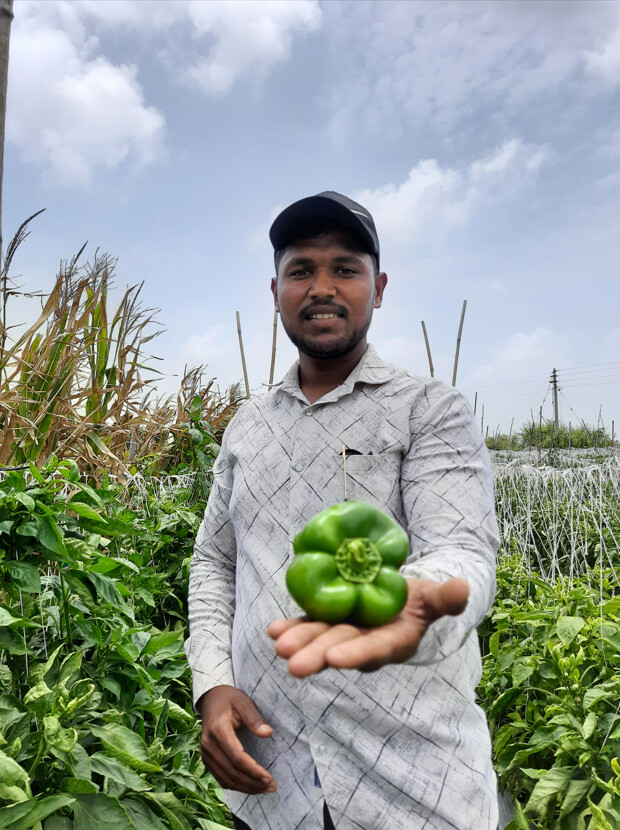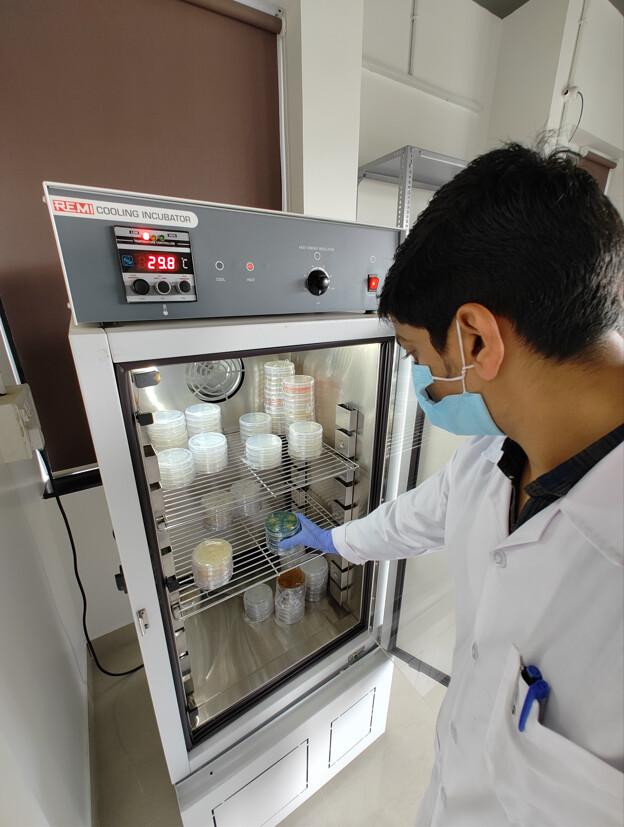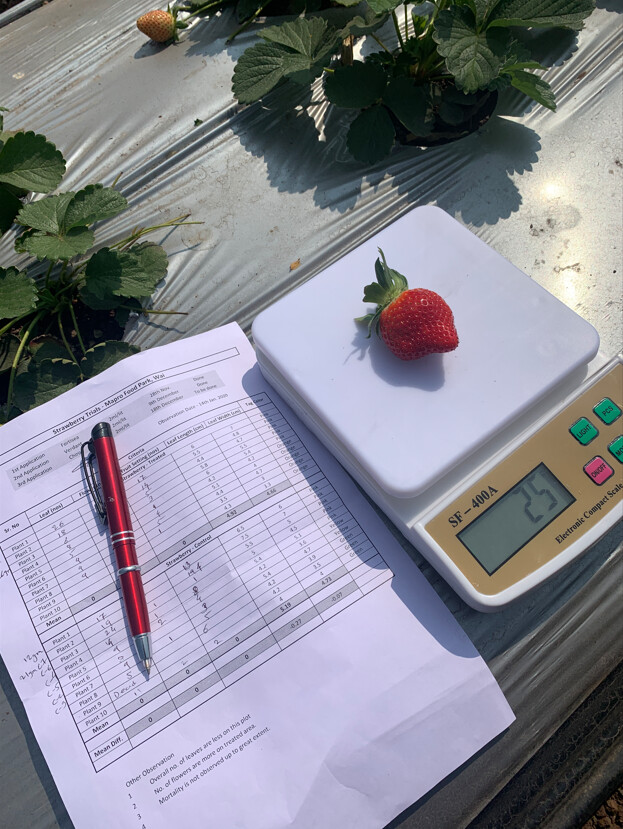Pune Scientists Find Solutions in Nature to Help Farmers Fight Crop Loss & Climate Change

Pune startup BioPrime AgriSolutions have developed SNIPR, a technology that harnesses the power of naturally-occurring microorganisms to help farmers increase crop yields while reducing their dependence on chemical fertilizers and pesticides.
In early 2016, Dr Renuka Diwan, Dr Shekhar Bhosale and Dr Amit Shinde embarked on a unique journey with tomato farmers in Narayangaon, a village in Pune district.
While Dr Diwan is an expert in genetic engineering, Dr Bhosale is a specialist in mycology. Dr Shinde is an authority in the development of bioactives, a type of chemical found in small amounts in plants and certain foods. The three scientists had just incorporated their venture BioPrime AgriSolutions, and developed a unique technology called Smart Nanomolecule Induced Physiological Response (SNIPR), which they believed could help farmers adapt to the vagaries of climate change.
Later that summer, Narayangaon and the larger western Maharashtra region would go on to experience its worst heat wave in 155 years, causing significant crop losses.
Speaking to The Better India, Dr Diwan says, “Initially, it was challenging to convince farmers to adopt our technology, as there was scepticism and resistance. To demonstrate the effectiveness of our solution, we decided to intervene at the seedling nursery stage, treating the tomato plants from the germination itself. This approach showcased tangible benefits, as farmers observed minimal transplantation shock and plant deaths in the treated seedlings.”
They treated thousands of plants in collaboration with the local nursery with a bio-stimulant containing a unique blend of biomolecules that triggered plant’s adaptive processes called “signalling molecules”, metabolites and antioxidants. Although farmers acknowledged the positive outcomes, they were still hesitant to provide their own land for further testing. However, as the heat wave intensified and the surrounding tomato crops suffered, the stark contrast between the treated plants and the affected ones became evident. (Image above of Dr Amit Shinde, Dr Renuka Diwan and Dr Shekhar Bhosale on the left)
“Our fields stood out with lush green hues and fully expanded leaves. Intrigued, farmers started approaching us, inquiring about our methods and the exceptional condition of our crops. This inspired us to name our first product ‘Verdant’,” she recalls. The contents of this bio-stimulant were formulated in the laboratory employing their proprietary SNIPR technology.
Getting farmers onboard
“Later that summer, a turning point came when 10 farmers decided to join our summer testing programme, which expanded to 100 within a few days due to the severity of the heat wave. Despite widespread crop loss, these farmers recorded a normal harvest at the end of the season, thanks to the efficacy of our technology. This success created a strong foothold for us in the region, and today, it is rare to find a farmer in that area who does not use our products,” she adds.
The concrete results they witnessed were the resilience and improved performance of the treated crops compared to the surrounding fields.
“Farmers experienced firsthand the ability of our products to mitigate the negative impacts of heat and viral infections. As word spread about our success in Narayangaon, more farmers became interested in adopting our technology. They recognised that our technology and the products it germinated, such as Verdant, Fortisea, and Chiron, provided them with reliable support and helped them achieve consistent yields in challenging conditions,” argues Diwan.
This initial success paved the way for wider adoption and expansion of their technology in rural India, empowering farmers to mitigate risks, enhance crop yields, and improve their livelihoods.
“Witnessing firsthand the power of climate resilience and how it could prevent harvest losses, we realised that we had an opportunity to bring pride and profitability back to farmers,” she says.
Since their introduction in 2016, their solutions have prevented significant crop losses due to untimely weather events for hundreds of farmers in districts like Pune, Satara and Nashik across Maharashtra, besides other states including Uttar Pradesh, Jharkhand, Bihar, Madhya Pradesh, Gujrat, Karnataka, Andhra Pradesh and Telangana.

Understanding the science
Dr Diwan and her team have developed cutting-edge technology that helps farmers increase crop yields while reducing their dependence on chemical fertilisers and pesticides. By harnessing the power of naturally-occurring microorganisms and biomolecules, BioPrime’s technology provides farmers with an eco-friendly solution to enhance the growth of their crops.
How does it do that? Here’s how Dr Diwan explains the science behind it.
“The naturally-occurring biomolecules and microorganisms we work with at BioPrime are an integral part of the plant’s ecosystem. They have coexisted with plants for centuries and play a crucial role in enhancing crop growth and resilience,” she explains.
“One of the key attributes of these microorganisms is their ability to form relationships with plants. In the past, with heirloom varieties of crops, this association was strong. The plants used to release around 70-80% of the carbon sequestered as exudates and sugars, which served as a food source for the beneficial microorganisms,” she adds.
In return, these microorganisms helped make essential nutrients more available to the plants, protected them from diseases and pests, and promoted overall plant health. It was a mutually beneficial relationship, where plants and microbes lived as a community.
However, with the development of modern agriculture and the focus on high-yielding varieties, this symbiotic relationship has been disrupted. The crops were bred to allocate more resources to yield, but in the process, farmers often neglected feeding the beneficial microbes.
As a result, plants became more dependent on synthetic additives such as chemical fertilisers, insecticides, and pesticides to meet their nutritional and protective needs.
Addressing imbalances
“At BioPrime, we address this imbalance by employing two main approaches. Firstly, we identify trigger molecules that can activate the dormant pathways in modern crop varieties, encouraging them to reestablish their interaction with beneficial microorganisms. By reintroducing these trigger molecules, we stimulate the plants to allocate resources towards nourishing and engaging with the microorganisms, thereby revitalising their symbiotic relationship,” she says.
Helping them identify these ‘trigger molecules’ is their proprietary screening platform SNIPR. This helps with discovering molecules that need to be activated for the crop to become tolerant to heat waves or other extreme climatic conditions.
“It’s not a single technology, but an amalgamation of all these processes we have developed. What the platform does is conduct a series of assays — bio-chemical, physiological, molecular and genomic-level — club all of them, conduct a subtractive analysis and discover the molecules we need to activate in, for example, a tomato crop to make it tolerant to heat waves,” she says.
The next step is understanding how you arrive at a formulation that can activate certain processes in the crop to make it tolerant to heat waves.
“We need multiple pathways to address something as complex as heat waves in this case. For example, heat tolerance will require something as superficial as the waxy coating on the leaves or the cell wall needing to be thicker. Heat tolerance will also require the plant cell to store more sugar and salt so that it can retain more water. Its roots will also need to have much finer tertiary branching so that they take up more water in drier conditions. It’s not enough to just have a thicker cell wall or a better root system. We need all of this together,” she explains.
“When we’re designing a formulation, we find trigger molecules that activate these processes. Our formulation will consist of these trigger molecules. When given to the plant, it will activate these processes instantly. SNIPR at one end tells us what processes to focus on. Once we get information on what processes to focus on, we go about finding trigger molecules,” she adds.
“We have to run tests and validate that triggering this molecule activates this process. Once it gets validated, we can make formulations, test it in controlled conditions, and then commercialise it. Arriving at a formulation is a long drawn process. It takes about 2.5 years to develop a formulation that can be tested on fields,” explains Diwan.
“Once we have field level testing, we have to check whether it works on all crops, in all geographical conditions, soil conditions, etc. This takes about two seasons — one kharif and rabbi [season ]— to make sure it works in all climatic conditions. Once we obtain regulatory approvals, we can launch our product. Products like Prime Chiron, Prime Aavirat, Prime 1515 and Prime Verdant are basically formulations we have arrived at thanks to SNIPR,” she adds.
“BioPrime has taken the drug-discovery approach employed in the pharmaceutical industry to designing agricultural biologicals,” says Dr Shinde.
Besides identifying trigger molecules that can activate the dormant pathways in modern crop varieties, BioPrime has also developed synthetic communities of microbes specifically tailored to restore and enhance the lost plant-microbe associations. Like humans, who cannot digest food without microbes, plants also need a core set of microbes to thrive and survive.
“These carefully selected microbial strains work in synergy to promote nutrient availability, enhance soil health, suppress diseases, and improve plant growth and resilience. These microbial communities act as natural allies for the plants, supporting their overall well-being and reducing their reliance on synthetic inputs,” explains Diwan. To discover these microbes, BioPrime has developed another proprietary platform called Bio-nexus.

Benefits of this technology
Dr Diwan claims, “Our biologicals can cut fertiliser requirements by up to 50%, enabling farmers to optimise their nutrient management and reduce input costs. Also, our biologicals also play a crucial role in pest and disease management. Currently, our products are being actively used in over 150,000 acres for more than 25 different crops.”
In business, they adopt a B2B approach. They establish strategic partnerships with large agri-input companies that have a presence and a pan-India distribution network.
“Their goals have to align with ours — sustainability and regenerative-agriculture focussed. Usually, these companies have a very strong chemical research and development (R&D) capacity, but haven’t necessarily invested in the biological discovery segment. They either partner with us to take our products to the market or work with us to co-develop products with us that they eventually take into the market,” explains Diwan.
However, they also share a direct interface with farmers on the ground, particularly in western Maharashtra and central Uttar Pradesh. BioPrime has their own team which operates like a small sales force.“We iterate the product along with the farmers. We have about 600 farmers who’ve been working on iterating the product with us. These are educated, marginal, export-oriented and small grain grower farmers as well,” she says.
To protect these farmers, however, they’ve put safeguards in place.
“Before we give any product to the farmer, it’s tested for environmental toxicity, cytotoxicity, exposure-related toxicity, etc., in GLP (Good Laboratory Practice)-approved labs. Following this, we validate every iteration of our product using the SNIPR platform to make sure it does what it says it does. We then do control-condition trials with growth-chambers and try the product out. After this, we take the product to our greenhouses where it’s tested on vulnerable seedlings. If there is any kind of harmful effect, we get rid of the cause right there,” explains Diwan.
Following this, they test it on an actual crop in controlled condition at their research farm. Once it clears this test, the product reaches the farmer. “Any chances of a wayward event is weeded out considerably. But in the event anything untoward happens to the farmer’s crop and he suffers losses, we reimburse them 100%. We don’t want farmers to suffer,” she adds.
One farmer who has benefitted from BioPrime’s intervention is Sachin Durape, a 32-year-old farmer from Narayangaon. An engineer by education, he is a second generation farmer.
“I cultivated chrysanthemums and saw that [Prime] Chiron led to 40% more yield, uniform flowers with vibrant colours and 4-5 days of extended shelf life,” he says.
However, he understood that he wasn’t getting full market value for his products. He noticed that middlemen were targeting distant markets with better prices. Taking a chance, he built a small cool room to store his harvests and started sending flowers as far as Hyderabad.
“I became the first farmer from Narayangaon to send produce to Hyderabad. From Rs 25/kg, I began fetching Rs 70/kg and more than doubled my income,” he adds.
Today, young farmers in his village seek his guidance. Many of them now club their produce and send it to markets like Bangalore and Hyderabad and earn far more than they did earlier.
Meanwhile, Sunil Verma, a fruit farmer from the Awadh region of Uttar Pradesh, also employed [Prime] Chiron, which gave him “uniform produce and a great strawberry harvest”.
“Realising that I won’t get a good price for my strawberry crop in the local market, I took a risk, made boxes with my brand name, employed members of my family to help sort and pack strawberries, and sold them in Lucknow for a handsome profit. After taking this risk, my earnings shot up nearly three times. Recently, I started my own farmer producer organisation (FPO) with little help from BioPrime. We help neighbouring farmers cultivate different fruits and take them to the Lucknow market. Now, we have our eyes set on the Delhi market,” he says.

Funding, taking the business forward
Thus far, they have received support from government-backed institutions such as the Biotechnology Industry Research Assistance Council (BIRAC), the Department of Biotechnology’s Atal Incubation Mission (DBT AIM), NITI Aayog, and the Indian Agricultural Research Institute (IARI), Pusa.
“Their support has been instrumental in fueling our research and development efforts, as well as providing valuable guidance and mentorship,” says Dr Diwan.
In addition to institutional state support, they have also raised venture capital funds like Omnivore. They have also secured funding from Inflexor Ventures, a prominent venture capital firm with a focus on early-stage technology startups.
“Looking ahead, we are actively exploring opportunities for Series A funding. This will enable us to accelerate our growth trajectory, expand our product portfolio, and extend our reach to more farmers and agricultural communities,” she adds.
(Edited by Divya Sethu; Images courtesy BioPrime AgriSolutions)








No comments:
Post a Comment
Please validate CAPTCHA